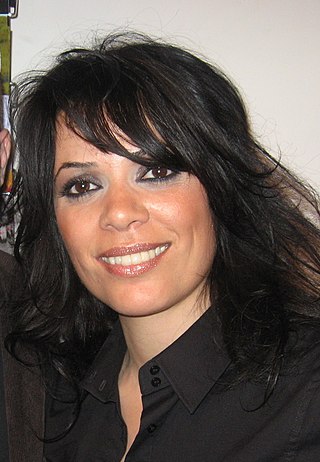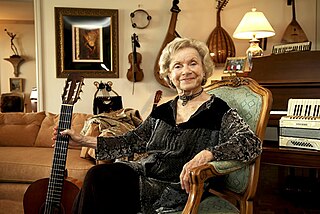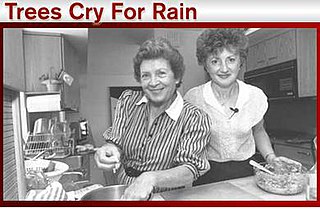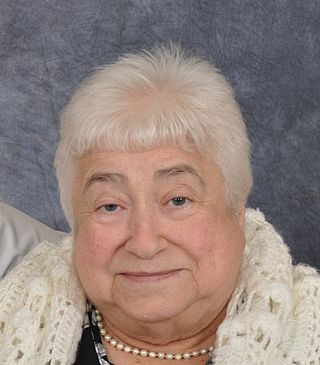Consuelo Luz Arostegui is an American singer. She performs and records as "Consuelo Luz" is known for her Ladino and Sephardic music.
Consuelo Luz Arostegui is an American singer. She performs and records as "Consuelo Luz" is known for her Ladino and Sephardic music.
Consuelo Luz Arostegui was born in Manhattan of Latin American parents and moved to Greece with them when she was a baby. She is the daughter of a Sephardic Chilean mother and a Cuban father of Basque descent. [1] Although raised Catholic, Luz was made aware of her Jewish ancestry at an early age. [1] Her parents were United Nations diplomats which had her growing up in many countries, including Greece, the Philippines, Spain, Italy and Peru.
Luz studied Spanish through the Overseas Cambridge University in Lima, Peru and later studied literature and music at the New School for Social Research in New York City. Further studies included drama at the Stella Adler Theater Studio.[ citation needed ]
In 1974, she moved her family to New Mexico where she met Rabbi Chavah Carp in Taos, who presented her with a collection of ancient Ladino prayers with text and music with a request that she learn them and sing them at community festivals and services. [2] This sparked Luz's interest in Ladino music and inspired her first Sephardic CD, Dezeo, in 2000. Since then Luz has performed internationally and produced and released many more recordings and this has led her to explore more deeply her Sephardic Jewish heritage.
Her work has received positive reviews by various publications and broadcasters. [3] Her music has been played on the national Hearts of Space Radio network and KUNM, and has been broadcast on the BBC.[ citation needed ]
Luz has two sons and a daughter. She lives in Santa Fe, New Mexico and is involved with the Ha Makom Congregation in Santa Fe, run by Rabbi Malka Drucker. [1]

SephardicJews, also known as Sephardi Jews or Sephardim, and seldomly as Iberian Peninsular Jews, are a Jewish diaspora population associated with the Iberian Peninsula. The term, which is derived from the Hebrew Sepharad, can also refer to the Jews of the Middle East and North Africa, who were also heavily influenced by Sephardic law and customs. Many Iberian Jewish exiled families also later sought refuge in those Jewish communities, resulting in ethnic and cultural integration with those communities over the span of many centuries.

Crypto-Judaism is the secret adherence to Judaism while publicly professing to be of another faith; practitioners are referred to as "crypto-Jews".
Sephardic music is an umbrella term used to refer to the music of the Sephardic Jewish community. Sephardic Jews have a diverse repertoire the origins of which center primarily around the Mediterranean basin. In the secular tradition, material is usually sung in dialects of Judeo-Spanish, though other languages including Hebrew, Turkish, Greek, and other local languages of the Sephardic diaspora are widely used. Sephardim maintain geographically unique liturgical and para-liturgical traditions.
Anusim is a legal category of Jews in halakha who were forced to abandon Judaism against their will, typically while forcibly converted to another religion. The term "anusim" is most properly translated as the "coerced [ones]" or the "forced [ones]".

Melanie Mayron is an American actress and director of film and television. Mayron is best known for her role as photographer Melissa Steadman on the ABC drama thirtysomething for which she won the Primetime Emmy Award for Outstanding Supporting Actress in a Drama Series in 1989, and was nominated for same award in 1990 and 1991. In 2018, the Santa Fe Film Festival honored Mayron for her outstanding contributions to film and television.

Yasmin Levy is an Israeli singer-songwriter of Judeo-Spanish music.

Marc D. Angel is a Modern Orthodox rabbi and author, Rabbi emeritus of Congregation Shearith Israel, the Spanish and Portuguese Synagogue in New York City, a position he has held since 1969.

Yehoram Gaon is an Israeli singer, actor, director, comedian, producer, TV and radio host, and public figure. He has also written and edited books on Israeli culture.

Sasha Sökol Cuillery is a Mexican singer, composer, actress and television presenter.

Margalit Matitiahu is a poet in Ladino and Hebrew from Israel.
Musta'arabi Jews were the Arabic-speaking Jews, largely Mizrahi Jews and Maghrebi Jews, who lived in the Middle East and North Africa prior to the arrival and integration of Ladino-speaking Sephardi Jews of the Iberian Peninsula, following their expulsion from Spain in 1492. Following their expulsion, Sephardi Jewish exiles moved into the Middle East and North Africa, and settled among the Musta'arabi.

Flory Jagoda was a Bosnian Jewish–born American guitarist, composer and singer-songwriter. She was known for her composition and interpretation of Sephardic songs, Judeo-Espanyol (Ladino) songs and the Bosnian folk ballads, sevdalinka.

Judaeo-Spanish or Judeo-Spanish, also known as Ladino, is a Romance language derived from Old Spanish. Originally spoken in Spain, and then after the Edict of Expulsion spreading through the Ottoman Empire as well as France, Italy, the Netherlands, Morocco, and England, it is today spoken mainly by Sephardic minorities in more than 30 countries, with most speakers residing in Israel. Although it has no official status in any country, it has been acknowledged as a minority language in Bosnia and Herzegovina, Israel, and France. In 2017, it was formally recognised by the Royal Spanish Academy.

Trees Cry for Rain: A Sephardic Journey is a short documentary film by American documentary filmmaker Bonnie Burt that follows "America's Internet Champion of Ladino" Rachel Amado Bortnick, as she explores her Jewish-Turkish heritage and the vanishing world of Sephardic culture and the Ladino language. The film was officially released in 1989, but drew public attention in 1992 with screenings at a number of Jewish film festivals worldwide, including the San Francisco Jewish Film Festival and the Madrid "Festival de Cine Judio" which was dubbed "the biggest Jewish cultural event held in Spain in 500 years". This was followed by a public screening at the Lincoln Center for the Performing Arts in New York, and airing on The Jewish Channel.

Matilda Koen-Sarano, is an Israeli writer. Born to Turkish Jewish parents, she is one of the most widely known writers in the Ladino language.

Sephardic Bikur Holim Congregation (SBH) is a Sephardic Jewish congregation with a synagogue in the Seward Park neighborhood of Seattle, Washington. The name Bikur Holim means visiting or comforting the sick, an important mitzvah. The first official name of the congregation was Spanish Hebrew Society and Congregation Bikur Holim, shortened to "Sephardic Bikur Holim". For a time in the 1930s, after amalgamation with another congregation, it was known as Bikur Holim Ahavath Ahim Congregation.

Sarah Aroeste is an American singer and composer. Her music is often referred to as "feminist Ladino rock." She also writes books for children with Sephardic themes.
Sephardic Bnei Anusim is a modern term which is used to define the contemporary Christian descendants of an estimated quarter of a million 15th-century Sephardic Jews who were coerced or forced to convert to Catholicism during the 14th and 15th century in Spain and Portugal. The vast majority of conversos remained in Spain and Portugal, and their descendants, who number in the millions, live in both of these countries. The small minority of conversos who did emigrate normally chose to emigrate to destinations where Sephardic communities already existed, particularly to the Ottoman Empire and North Africa, but also to more tolerant cities in Europe, where many of them immediately reverted to Judaism. In theory, very few of them would have traveled to Latin America with colonial expeditions, as only those Spaniards who could certify that they had no recent Muslim or Jewish ancestry were supposed to be allowed to travel to the New World. Recent genetic studies suggest that the Sephardic ancestry present in Latin American populations arrived at the same time as the initial colonization, which suggests that significant numbers of recent converts were able to travel to the new world and contribute to the gene pool of modern Latin American populations despite an official prohibition on them doing so. In addition, later arriving Spanish immigrats would have themselves contributed additional converso ancestry in some parts of Latin America.
Jewish women in the early modern period were a crucial part to all Jewish societies, as they made up half of the population. Living in places such as Italy, Poland-Lithuania, and the Ottoman Empire had effects on the role Jewish women played in their society. Different customs and regulations were found in various societies around the world.
Judith Rita Cohen is a Canadian ethnomusicologist, music educator, and performer. Her research interests include Judeo-Spanish (Ladino) songs; medieval and traditional music from the Balkans, Portugal, French Canada, and Yiddish; pan-European balladry; and songs from Crypto-Jewish regions in Portugal. She has received numerous research and travel grants to do fieldwork in Spain, Portugal, Morocco, Israel, Turkey, Greece, France, Belgium, Canada, and the United States, and has published many journal articles, papers, and book chapters. She plays a variety of medieval musical instruments, and sings and performs as part of her lectures and in concerts and solo recitals. She is also the editor of the Alan Lomax Spanish collection maintained by the Association for Cultural Equity.
additional website for new sound healing work: www.vocalchemy.com